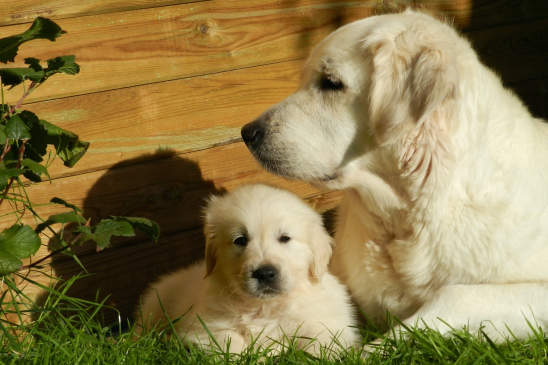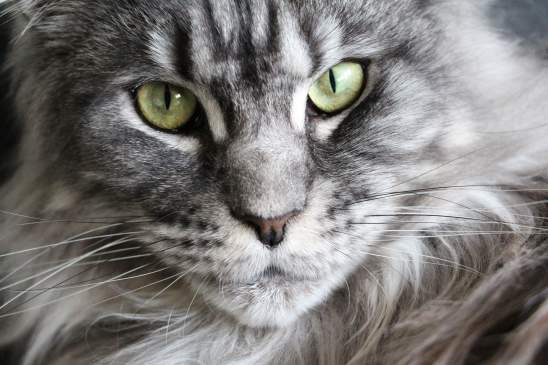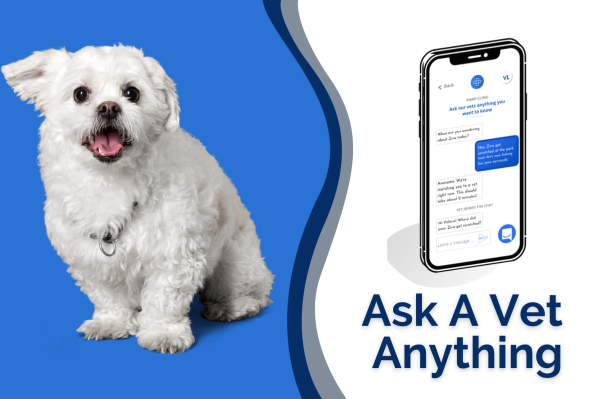Looking for vet advice on the internet can be tricky. It can be hard to get answers that really fit your pet's unique needs. General vet advice can only take you so far — what about their breed, age, weight? If you've ever had a question about your dog or cat, or if you have one now, speaking with Pawp's online vets can allow you to get a handle on your pet's situation.
Pawp's 24/7 talk to a vet platform allows you to get answers from real vets for any question or emergency at any time, day or night. You don't have to wait until office hours and you don't need an appointment. Best of all, it's contact free, keeping you and your pet safe.
Like last week, we asked Pawp's online vets to share some interesting questions about cats and dogs they got this week from concerned pet parents. You can text a vet anytime day or night if you have a question yourself!
Ask Pawp's Online Vets Anything
How can I tell if my dog is pregnant?
In general, dogs go into heat around one to three times per year (smaller, more often and larger, less often). If your dog mated while in heat, her pregnancy will last around nine weeks. Early signs your dog is pregnant include your dog throwing up from morning sickness and enlarged nipples that produce a semi-clear fluid. You may also notice behavior changes, like nesting and being territorial over things she may not have been before.
Later in the pregnancy, you will notice your dog's appetite increasing and her gaining weight. You'll definitely want to get her on a protein-rich food during this stage (puppy-specific food can be very good). Around 48 hours before giving birth, her nipples will start to produce milk.
Read More: Everything To Know About Dog Pregnancy

My puppy got vaccinated yesterday and he's still very sleepy. Is this normal?
Vaccinating your puppy helps prevent infections and disease, which is a very necessary aspect of being a pet parent, but that doesn't mean it can't be worrying. Your puppy may have a few vaccination side effects — fatigue, appetite loss, swelling, or sneezing — which are totally normal within 48 hours of being vaccinated.
However, if the lethargy persists for longer than 48 hours, it may be time to speak with a vet. You should also speak to the vet if your puppy is throwing up consistently, experiencing bad diarrhea, having trouble breathing, or swelling around the face.
Read More: Should I Get My Dog Vaccinated? (Yes!)
My dog keeps having random bursts of energy. How do I calm her down?
Zoomies, otherwise known as Frenetic Random Activity Periods (or FRAPs), occur when your dog has either too much energy or is experiencing stress. These unpredictable bursts of energy are common enough and not dangerous (unless your dog is knocking into a lot of things).
Solving for zoomies is pretty simple — most times your dog just needs a little more exercise. Let them run it off in your backyard or a nearby dog park. If the zoomies are triggered by a stressful situation that is likely to happen again, like taking a bath, you can teach your dog to make more positive associations with these situations by giving them extra treats or a special toy they can only play with during bath time.
Read More: What Are Zoomies? What To Do When Your Dog Has ENERGY
I have an older cat with a chronic kidney disease. How can I keep him comfortable?
Chronic Kidney Disease, where kidney function diminishes over time, is unfortunately very common in senior cats. CKD requires a diagnosis from a vet and while it can't be cured, it can be treated with medication and (if necessary) surgery. After your cat is officially diagnosed and on the correct course of medications, there are a few things you can do at home to help make him more comfortable.
Firstly, make sure you keep your cat hydrated. Pawp vets often recommend wet food for cats to make sure they're getting some extra water into their diet. We also recommend a cat water fountain, as cats like moving water and it can encourage them to drink more. You can also try a kidney-specific cat food formulated with specific vitamins and minerals meant to aid kidney function. Renal supplements may also help. Talk to a Pawp vet about your options.
Read More: 6 Ways To Make Your Senior Cat's Life More Comfortable
My cat is overweight, but eating the right amount. What can I do to help her lose weight?
The first thing to consider is what you're feeding your cat. Is your food high in protein with very few fillers? Are you adding in treats throughout the day? Next, how much is your cat moving throughout the day. Dedicate some time in the mornings and evenings to get your cat exercising through some fun play time.
If your cat is eating the recommended amount of quality cat food, exercising regularly, and still not losing weight, the next step is to reduce the amount of food your cat is eating from anywhere between 10-30%. Talk to a Pawp vet about a specific weight-loss plan for your cat.
Read More: Is Your Cat Fat? 3 Ways To Keep The Pounds Off

My cat has started pooping outside of her litter box. What do I do?
There are a few reasons your cat may no longer be using her litter box. It sounds like this is a new occurence so the first question we have is: has anything changed in the last while? Did you get a new litter box? Have you changed the litter type? Are you cleaning it regularly? Did you move it somewhere different? Are any new cats using it?
For the most part, cats are clean and hygienic creatures who like their litter boxes to be an extension of that... so that means it might be something on your end. Check all the recent factors that may be making your cat nervous and adjust accordingly. It's also a good rule of thumb to make sure you have one litter box per cat — just in case.
